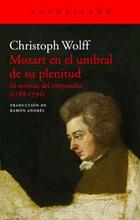In this essay Wolff discusses the biographical and musical implications of the composer's appointment to the court of Emperor Joseph II of Vienna, the "imperial style" in his most representative works of the period and a repertoire of pieces, mostly unknown, which he left unfinished. Does Mozart's extraordinary final production, the beginning of which marks the three great symphonies of 1788, not invite the aesthetic orientation of the composer's last works to be rethought? In a 1790 letter, two years after entering imperial service as a chamber composer, Mozart wrote that he was on the threshold of his fullness: no doubt the appointment of the composer, who had intended a fixed salary, a prestigious title and few obligations, contributed to his prolific production. Through Mozart's documents, scores and letters to his close friends, Wolff not only creates an intense account, but offe...read more
All book titles by this author
|
Title |
Price | ||
|---|---|---|---|
|
|
Mozart en el umbral de su plenitud Author: Christoph Wolff Publisher: Acantilado |
$760.00
25%$570.00 |
Shopping cart
Loading cart
Important notices
|
|
Recordando a André Rouillé: Su legado en la fotografía André Rouillé 1948 - 2025 |
|
|
Libros de filosofía y co. Disponibles en Librería Herder |
|
|
Revista Filosofía & Co. nº 9 Nueva revista de filosofia divulgativa y actualidad |
|
|
"Espacios de la filosofía" - Mauricio Beuchot - Novedad Herder México |
|
|
Revista Filosofía & Co. nº 8 Nueva revista de filosofia divulgativa y actualidad |
Pay safely with:


In the webshop
New
|
|
Revista Filosofía & Co. No. 15 70591 $200.00 -0.00% $200.00 |
|
|
El bestiario de Michel Foucault 70404 $749.00 -15.00% $636.65 |
|
|
La fuerza de los fuertes 70405 $519.00 -15.00% $441.15 |
|
|
Su Majestad 70410 $319.00 -15.00% $271.15 |
|
|
El arte de la fantasía 70407 $759.00 -15.00% $645.15 |
In the press
Promotions
|
|
Panorama A1.1, Deutsch als Fremdsprache Übungsbuch 36726 $235.00 -35.00% $152.75 |
|
|
Diccionario de términos filológicos 70241 $900.00 -25.00% $675.00 |
|
|
Prosa y poesía. Homenaje a Gonzalo Sobeja 70242 $1,755.00 -25.00% $1,316.25 |
|
|
Lingüística española aplicada a la terapia del lenguaje 70239 $300.00 -25.00% $225.00 |
|
|
Introducción a la filosofía 70243 $620.00 -25.00% $465.00 |







